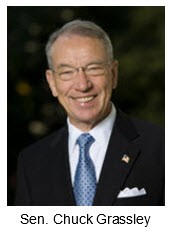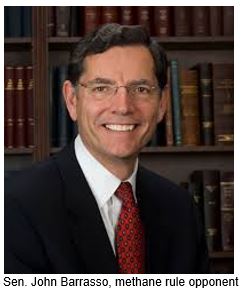WASHINGTON, May 10, 2016 – Two backroom Senate battles over energy escalated this week, with at least an interim resolution possible Wednesday. A mixed result could have ended Obama administration curbs on oilfield methane emissions and lead to authorizing year-round sales of E15 (15 percent ethanol fuel).
 The intensity of the battles is clear from one staffer’s comment to Agri-Pulse that after deadlocked staff negotiations, “the members themselves are talking on methane and E15. They haven’t resolved things yet.” Key negotiators include Senate Judiciary Committee Chair Chuck Grassley, R-Iowa, fighting for E15, and Senate Environment and Public Works Committee Chair John Barrasso, R-Wyo., leading efforts to repeal the methane rule.
The intensity of the battles is clear from one staffer’s comment to Agri-Pulse that after deadlocked staff negotiations, “the members themselves are talking on methane and E15. They haven’t resolved things yet.” Key negotiators include Senate Judiciary Committee Chair Chuck Grassley, R-Iowa, fighting for E15, and Senate Environment and Public Works Committee Chair John Barrasso, R-Wyo., leading efforts to repeal the methane rule.
The major battle is over the GOP drive to repeal last November’s Bureau of Land Management Waste Prevention rule restricting methane venting and flaring on public and tribal lands. The House voted for repeal in February. But the Senate on Wednesday unexpectedly voted down a resolution to repeal the rule, 51-49, with three Republicans joining every Democrat to sustain the rule. That leaves President Trump with a very limited window to use the Congressional Review Act to overturn another Obama-administration regulation. The deadline to use the expedited procedure expires on Thursday, May 11.
In the second and related battle, Grassley and his GOP colleagues John Thune of South Dakota, Deb Fischer of Nebraska and Joni Ernst of Iowa had threatened to make their repeal votes contingent on getting a Clean Air Act waiver or other change to unleash E15 sales during the summer.
In the end, Sen. John McCain, R-Ariz., voted no against a motion to proceed with consideration of the resolution, as did Republicans Susan Collins of Maine and Lindsay Graham of South Carolina.
Methane rule supporters, like Colorado Sen. Michael Bennet had pointed out that the benefits from the rule, including cleaner air and more jobs, are proven thanks to similar methane restrictions that Colorado introduced at the state level in 2014, with positive results and broad public support.
 What concerns some Republicans along with Democrats and environmental and public health advocates is that under CRA rules, future administrations would be blocked from implementing any similar methane restrictions without new legislation. They also point out that while the BLM methane rule was the end result of years of “public testimony, analysis, and research,” repeal this week would come without any similar input.
What concerns some Republicans along with Democrats and environmental and public health advocates is that under CRA rules, future administrations would be blocked from implementing any similar methane restrictions without new legislation. They also point out that while the BLM methane rule was the end result of years of “public testimony, analysis, and research,” repeal this week would come without any similar input.
Such concerns don’t impress repeal advocates. Myron Ebell at the Competitive Enterprise Institute, Thomas Pyle at American Energy Alliance, Grover Norquist at Americans for Tax Reform, and eight other conservative groups sent a joint letter to senators last week, charging that without repeal, the BLM rule “will cost roughly $297 million per year” and “decrease energy production on federal lands, leading to fewer revenues from royalties and higher energy costs, not to mention lost jobs.”
In sharp contrast, Senate Energy Committee ranking member Maria Cantwell, D-Wash., said at a press briefing on Monday that wasteful flaring, venting, and methane leaking not only means lost production for oil companies but a reduction in royalty payments to the federal government. Warning that “it would be a huge step backward if the Senate repealed the BLM methane rule,” she said the choice is between “a common-sense rule that is already saving taxpayers money” or “we can go back to more pollution and more waste.”
At the press briefing with Cantwell, Gunnison County, Colorado, Commissioner John Messer, said that along with generating new jobs and an estimated $800 million in added royalty payments over the next 10 years if the BLM rule survives, “a recent poll found that 83 percent of Coloradans support the BLM natural gas waste rules, including supermajority support among Republican voters.”
Listing high costs from wasted methane, Taxpayers for Common Sense President Ryan Alexander wrote senators Monday, pointing out that in 2014 alone, $444 million worth of natural gas was vented or flared from federal and tribal lands.
“This leaked, vented, or flared gas represents a significant loss of royalty revenue from development of a taxpayer-owned resource,” Alexander wrote. “The royalty value of the gas currently being vented or flared is roughly $50 million a year, an amount that will likely increase as production continues to grow and natural gas prices increase from their historic lows.”
The two sides’ sharply different forecasts for the methane rule’s costs, benefits, and effects on production show just how complex the issues are. The rule’s backers point out that currently wasted methane can be captured and sold to generate increased production, oil company profits, and royalty payments. The rule’s opponents insist instead that the industry is already capturing more methane every year and that no more “federal overreach” is needed to bolster existing market incentives. They add that they will sell even more methane once the government streamlines permitting for the new natural gas pipelines needed to deliver captured methane to market.
Robert Dillon, spokesman for the American Council for Capital Formation and former longtime Senate Energy Committee staffer, tells Agri-Pulse that with a serious effort under way to reform the Renewable Fuel Standard (RFS), it makes no sense to delay the methane rule repeal over an E15 waiver “when there is a bigger reform effort starting to grow.”
Dillon explains that “in a nod to Sens. Grassley and Thune, Environmental Protection Agency head Scott Pruitt has signaled a willingness to have the agency consider a waiver of Clean Air Act restrictions against selling gasoline with a blend of more than 10 percent ethanol.” He adds that E15 hearings are possible and that EPW Chairman Barrasso “may be willing to have the committee look at the ethanol ‘blend wall’ to keep the methane vote on track.”
But Dillon concludes that “whether those offers are enough to end the (E15) hostage situation over the methane disapproval resolution remains to be seen.”
American Petroleum Institute spokesperson Sabrina Fang tells Agri-Pulse that rather than authorize more E15 use, the real need is “to fix the broken RFS program, and we continue to urge Congress to do just that.”
Calling for haste rather than further deliberation, Growth Energy CEO Emily Skor warns that without quick action by Congress or the administration, “E15 will be locked out of the market in less than a month.”
“Consumers, farmers, fuel retailers, and biofuel advocates across the country are counting on Congress to pass important legislation to lift outdated restrictions on summer sales of E15,” Skor explains. “Drivers should have year-round access to an affordable, high-octane option that reduces emissions and supports economic growth in rural communities.”
Adding to the already complex tangle of issues tied to the Senate’s methane vote, Scott Segal, an attorney with Bracewell LLP, tells Agri-Pulse that any changes to boost E15 use “must be paired with other changes that make the RFS (biofuels) program more rational.” Seeing an urgent need to combat fraud in the biofuels market, he warns that until the program focuses on compliance, “fraud is going to be a constant, fueling calls for getting out of the program altogether.”
(This story was updated May 10 to include the Senate vote on the methane rule.)
#30


